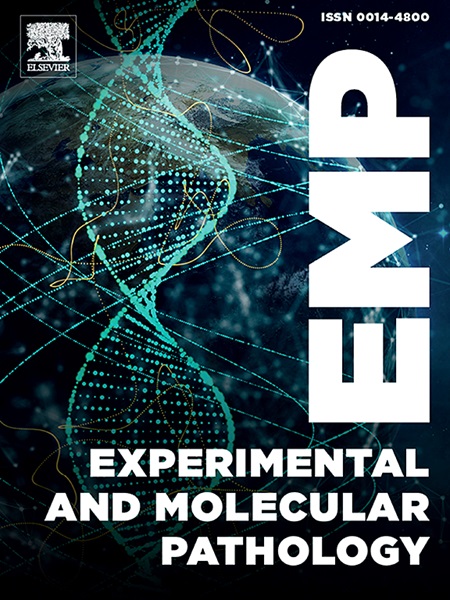Cell-specific functions of STAT3 in osteoarthritis and its therapeutic potential
IF 3.7
4区 医学
Q2 PATHOLOGY
引用次数: 0
Abstract
Osteoarthritis (OA) represents a prevalent chronic joint disorder, which is pathologically characterized by cartilage degeneration. At present, effective therapeutic interventions for OA remains relatively infrequent, highlighting the urgent need for a deeper exploration of the underlying mechanisms of the disease and the development of novel, more effective treatments. A growing body of research has increasingly highlighted the pivotal role of signal transducer and activator of transcription 3 (STAT3), a critical downstream effector protein activated by a diverse array of cytokines, in mediating various physiological and pathological processes. STAT3 has been implicated in the pathophysiological progression of OA, influencing key aspects of disease development. This review concentrated on the notable role and molecular mechanisms of STAT3 signalling in the degeneration of cartilage and dysfunction of the subchondral bone, while synthesizing the most recent evidence regarding the therapeutic potential of targeting the STAT3 pathway for OA management. By concentrating on the inhibition of STAT3 signalling pathway, this review aimed to contribute to the translation of these findings into innovative, clinically relevant treatment strategies for OA.
STAT3在骨关节炎中的细胞特异性功能及其治疗潜力
骨关节炎(OA)是一种常见的慢性关节疾病,其病理特征是软骨变性。目前,有效的OA治疗干预措施仍然相对较少,这表明迫切需要更深入地探索该疾病的潜在机制,并开发新的、更有效的治疗方法。越来越多的研究越来越强调信号换能器和转录激活因子3 (STAT3)的关键作用,STAT3是一种由多种细胞因子激活的关键下游效应蛋白,在介导各种生理和病理过程中起着关键作用。STAT3参与OA的病理生理进展,影响疾病发展的关键方面。这篇综述集中于STAT3信号在软骨退变和软骨下骨功能障碍中的重要作用和分子机制,同时综合了针对STAT3通路治疗OA的最新证据。通过关注STAT3信号通路的抑制,本综述旨在将这些发现转化为OA的创新的、临床相关的治疗策略。
本文章由计算机程序翻译,如有差异,请以英文原文为准。
求助全文
约1分钟内获得全文
求助全文
来源期刊
CiteScore
8.90
自引率
0.00%
发文量
78
审稿时长
11.5 weeks
期刊介绍:
Under new editorial leadership, Experimental and Molecular Pathology presents original articles on disease processes in relation to structural and biochemical alterations in mammalian tissues and fluids and on the application of newer techniques of molecular biology to problems of pathology in humans and other animals. The journal also publishes selected interpretive synthesis reviews by bench level investigators working at the "cutting edge" of contemporary research in pathology. In addition, special thematic issues present original research reports that unravel some of Nature''s most jealously guarded secrets on the pathologic basis of disease.
Research Areas include: Stem cells; Neoangiogenesis; Molecular diagnostics; Polymerase chain reaction; In situ hybridization; DNA sequencing; Cell receptors; Carcinogenesis; Pathobiology of neoplasia; Complex infectious diseases; Transplantation; Cytokines; Flow cytomeric analysis; Inflammation; Cellular injury; Immunology and hypersensitivity; Athersclerosis.

 求助内容:
求助内容: 应助结果提醒方式:
应助结果提醒方式:


